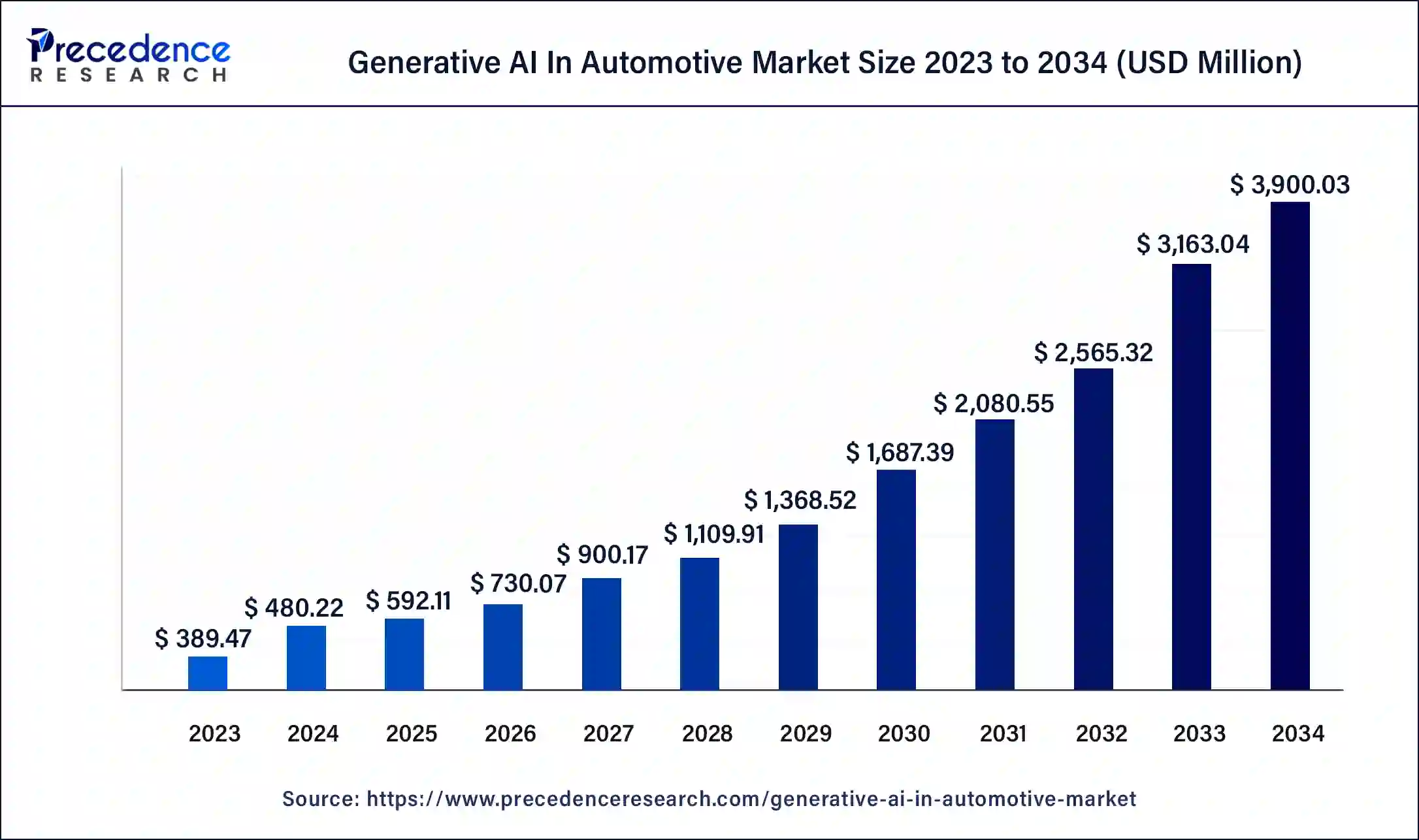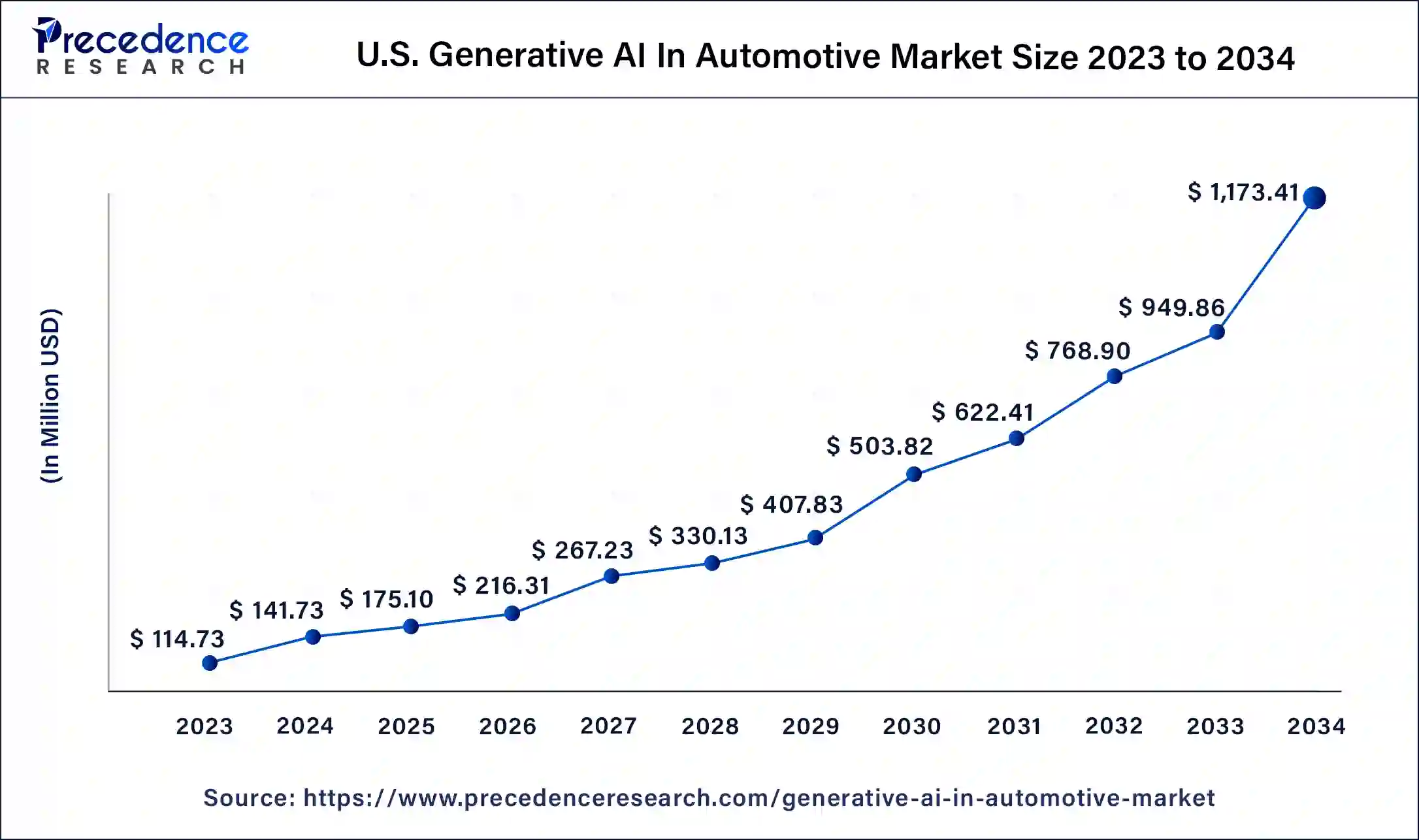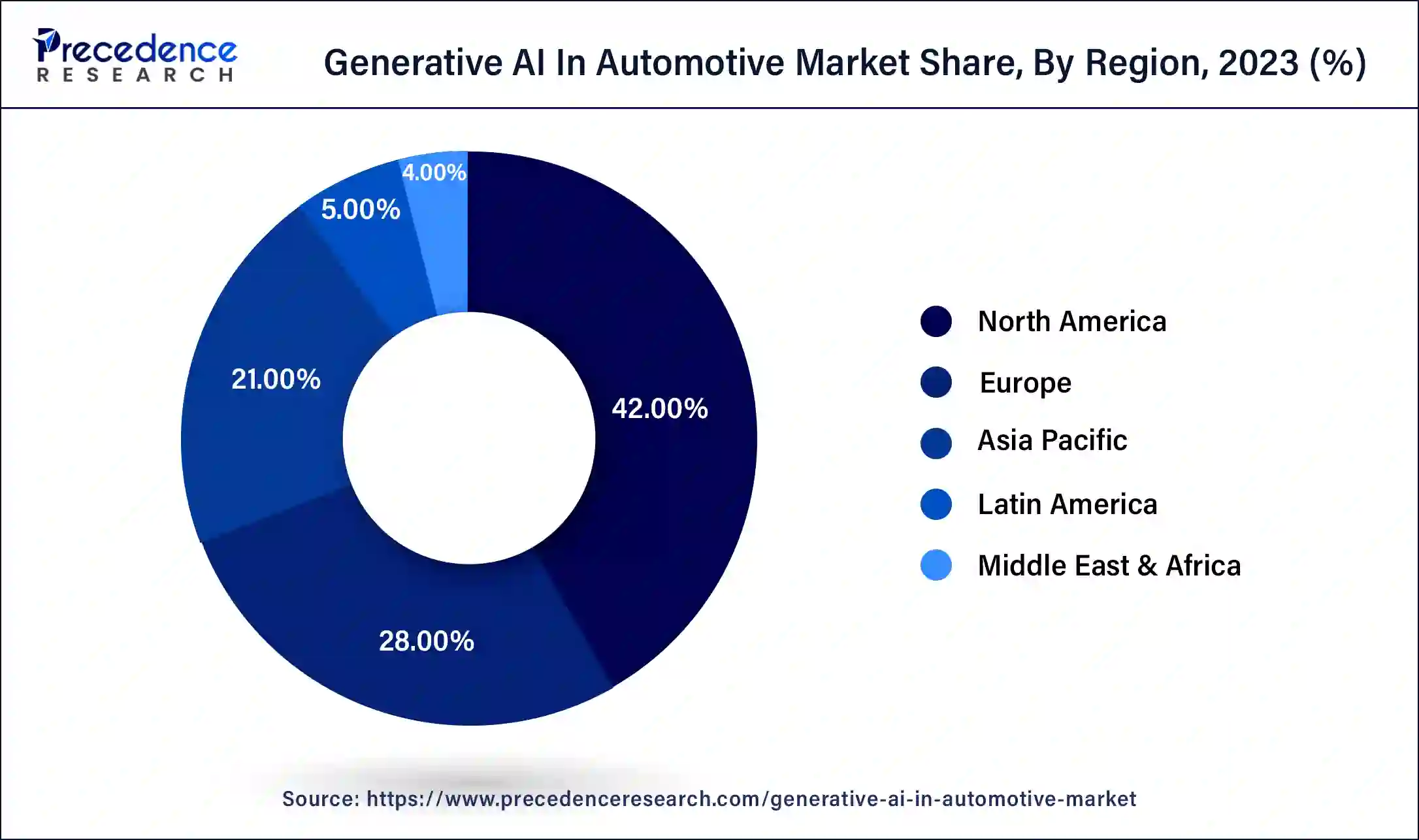Generative AI in Automotive Market Size and Forecast 2025 to 2034
The global generative AI in automotive market size was calculated at USD 480.22 million in 2024 and is expected to reach around USD 3,900.03 million by 2034, expanding at a CAGR of 23.30% from 2025 to 2034.

Generative AI in Automotive Market Key Takeaways
- In terms of revenue, the market is valued at $592.11 billion in 2025.
- It is projected to reach $3,900.03 billion by 2034.
- The market is expected to grow at a CAGR of 23.30% from 2025 to 2034.
- North America generated more than 42% of revenue share in 2024.
- Asia Pacific is projected to expand at the fastest CAGR from 2025 to 2034.
- By vehicle type, the passenger vehicles segment is expected to dominate the market during the forecast period.
- By vehicle type, the commercial vehicles segment is observed to witness a noticeable growth during the forecast period.
- by technology, the machine learning segment is expected to grow significantly during the forecast period.
- by application, the vehicle design segment is expected to dominate the market over the forecast period.
U.S. Generative AI In Automotive Market Size and Growth 2025 to 2034
The U.S. generative AI In automotive market size was estimated at USD 175.10 million in 2024 and is predicted to be worth around USD 1,173.41 million by 2034, at a CAGR of 23.5% from 2025 to 2034.

North America is expected to dominate the market during the forecast period. In the automobile sector, the region is leading generative AI research and development. The development of generative AI technologies for car design, manufacturing optimization, autonomous driving systems, and other applications is supported by partnerships between renowned research institutes, universities, and the automotive industry.
This emphasis on R&D encourages innovation and the creation of state-of-the-art generative AI technologies. In addition, the creation and application of generative AI in the automobile industry are significantly impacted by the regulatory environment in North America. The National Highway Traffic Safety Administration (NHTSA) in the United States and Transport Canada are two examples of government organizations that have a significant impact on the regulatory environment for autonomous driving systems and associated technology. For generative AI to be successfully used in the North American automobile industry, compliance with laws and safety norms is crucial. Therefore, driving the market growth in the region.
Additionally, strategic initiatives by key market players to expand their presence the new product launches, partnerships, or collaborations aim to expand their presence and gain strategic benefits over competitors, driving the expansion of Generative AI in the Automotive Market. For instance, in December 2024, Synopsys, a silicon provider software company, and SiMa.ai, a machine learning system-on-chip (MLSoC)company, announced a strategic collaboration. This partnership aims to accelerate the development of AI-enabled silicon and software for next-generation vehicles. The joint solution is designed to address the increasing demands of Advanced Driver Assistance Systems (ADAS) and In-Vehicle Infotainment (IVI) applications.

Asia Pacific is expected to experience a considerable growth rate over the forecast period. A substantial rate of technological improvements in most industries in the Asia Pacific highlights the growth of the market in the region. Countries such as China and Japan are observed to be the largest contributors to the growth of the market in the region. Moreover, the regional growth is attributed to the increasing product launches by the market players operating in the region. For instance, in June 2023, Toyota Research Institute (TRI) announced the release of a generative artificial intelligence (AI) method to help automotive designers. Designers may already use freely accessible text-to-image generative AI technologies as a first stage in their creative process. With TRI's innovative approach, designers may speed up this process by reducing the limitations with sketches and engineering allowing with lowering the number of iterations required to balance the design.
According to the IEA, A total of 17.3 million electric cars were produced worldwide in 2024, about one-quarter more than in 2023, largely as a result of increased production in China, which reached 12.4 million electric cars. China remains the world's electric car manufacturing hub, accounting for more than 70% of global production in 2024.
- In May 2025, Minus Zero, a Bengaluru-based startup, unveiled what it claims to be India's first end-to-end AI-based autopilot system designed to navigate dense urban traffic. The startup focuses on an AI-first approach to autonomous driving and end-to-end driving models that replace traditional modular AV architecture with a single foundational model.
Market Overview
Generative AI has made significant advancements in several industries, including the automobile industry. Generative AI is the technology that allows machines to produce new content, such as images, text, or even full designs, based on patterns and data that the machine has been trained on. In the automotive sector, this technology has the potential to transform vehicle design, production and autonomous systems. Vehicle design is one of the most prominent applications of generative AI in the automobile sector. Traditionally, creating a new automobile entails multiple iterations and prototypes, which takes a significant amount of time and resources. To produce new and inventive automotive designs, generative AI algorithms may examine existing vehicle designs, consumer preferences, market trends, and even engineering restrictions. This technology can help automobile designers explore new options, speed up the design process, and perhaps create more aesthetically appealing and functional vehicles. Furthermore, this technology has the potential to improve the production process in the automotive sector.
- According to a report by J.D. Power, the application of AI in automobile evaluations may boost accuracy by 10%, resulting in equitable and open pricing for buyers and sellers.
- As per the Study by the International Data Corporation, by 2025, the global automobile sector would invest $11.1 billion in cognitive and AI technologies.
- According to a study by Accenture, the potential for generative AI to increase customer happiness and loyalty is shown by the finding that 83% of automobile customers are prepared to reveal their data in return for a more customized car buying experience.
- According to secondary analysis, the usage of generative AI in the auto parts sector may result in a 10–20% decrease in the cost and time of developing new car systems and components.
Generative AI in Automotive Market Growth Factors
Generative AI algorithms can find areas for improvement, decrease faults, and enhance production efficiency by evaluating massive volumes of data associated with manufacturing processes, supply chain logistics, and quality control. This technology can assist car manufacturers in lowering costs, increasing productivity, and improving overall product quality. The generative AI in the automotive market is driven by several factors including the growing automotive sector, increasing investment in advanced technology, growing product launches, rising government initiatives, increasing trend of connected cars and growing R&D for autonomous vehicles.
Market Scope
| Report Coverage | Details |
| Market Size by 2034 | USD 3,900.03 Million |
| Market Size in 2025 | USD 592.11 Million |
| Market Size in 2024 | USD 480.22 Million |
| Growth Rate from 2025 to 2034 | CAGR of 23.30% |
| Largest Market | North America |
| Fastest Growing Market | Asia Pacific |
| Base Year | 2024 |
| Forecast Period | 2025 To 2034 |
| Segments Covered | Vehicle Type, Technology, Application, and Region |
| Regions Covered | North America, Europe, Asia-Pacific, Latin America, and Middle East & Africa |
Market Dynamics
Drivers
Increasing utilization of generative AI in the supply chain
For automakers, generative AI can improve every step of the supply chain, including distribution, inventory management, and purchasing. By examining data from suppliers, production methods, and consumer demand, AI models may produce insights and recommendations for enhancing supply chain efficiency. By studying data on supplier performance, manufacturing capacity, and transit durations, for instance, lead times throughout the supply chain may be improved.
AI models are capable of producing suggestions to shorten lead times at each level of the supply chain by taking these variables into account. Similar to this, generative AI can estimate future demand for automobiles or components by examining historical data, market patterns, and other relevant criteria. This may assist manufacturers with demand forecasting and inventory optimization. Recently, generative AI has been employed by Mahindra & Mahindra and CEAT Tyres to provide precise inventory visibility, data transparency, and inventory optimization. Thus, this is expected to drive market growth during the forecast period.
Restraint
Regulatory and safety concerns
The automotive industry is subject to rigorous regulatory standards and safety requirements. Introducing generative AI technologies, especially in safety-critical areas such as autonomous driving, necessitates compliance with regulations and ensuring that the generated outputs meet the required safety standards. Meeting these standards and obtaining regulatory approvals can be time-consuming and resource-intensive. Thus, the regulatory and safety concerns consider as a major restraint for the market revenue growth.
Opportunity
Growing uses in autonomous driving and ADAS
The advancement of autonomous driving systems and advanced driver assistance systems (ADAS) presents significant opportunities for generative AI in the automotive market. Generative AI algorithms can assist in the development and training of autonomous driving systems, improving perception, decision-making, and control capabilities. This opportunity allows manufacturers to enhance safety, reliability, and overall performance in autonomous vehicles. For instance, Alphabet subsidiary Waymo is leading the way in this field in terms of the application of generative AI. To train their self-driving algorithms, they use models to generate thousands of different scenarios that each replicate a different real-world situation. Waymo can expose its autonomous driving systems to a variety of driving conditions using AI, enhancing its safety and robustness.
Vehicle Type Insights
Based on the vehicle type, the global generative AI in the automotive market is segmented into passenger vehicles and commercial vehicles. Passenger vehicles are expected to dominate the market during the forecast period. Automakers have integrated AI into passenger vehicles including automobiles and motorbikes. AI has the potential to significantly enhance the comfort and safety of passengers in any type of vehicle. To interpret data from numerous sensors, including cameras, radars, and LiDARs, ADAS frequently uses artificial intelligence (AI).
On the other hand, the commercial vehicles segment is expected to grow substantially during the projected period. Commercial vehicles are progressively using AI to provide intelligent logistics and routing, fleet management, predictive maintenance, and autonomous capabilities. These applications have increased safety, improved vehicle performance and economy, and improved logistics, making the development of self-driving commercial cars more viable. As a result, when AI develops and improves further, it is positioned to make huge advancements in commercial vehicles, increasing total productivity. Thus, this is expected to drive segment expansion over the forecast period.
Technology Insights
Based on the technology, the global generative AI in the automotive market is segmented into machine learning, natural language processing, computer vision, context-aware computing and others. The machine learning segment is expected to grow significantly during the forecast period. Machine learning algorithms are utilized to generate training data for generative AI models in the automotive industry. For instance, in the context of autonomous driving, machine learning algorithms can analyze large amounts of real-world driving data to create artificial datasets that mimic different driving scenarios. These synthetic datasets can be used to train generative models, enhancing their ability to generate accurate and realistic responses to various situations. In addition, these algorithms are instrumental in vehicle design and styling using generative AI. Therefore, the utilization of machine learning in different applications of the automotive sector is expected to drive segment growth during the forecast period.
Application Insights
Based on the application, the global generative AI in the automotive industry is divided into vehicle design, manufacturing optimization, transportation & logistics, autonomous driving and ADAS. The vehicle design segment is expected to dominate the market over the forecast period. The simulation and 3D depiction of vehicles are one of the most effective uses of generative AI in the automotive sector. BMW's usage of AI in its design process is a prime example. BMW built an AI-based system that uses the concepts of generative design. The system creates a wide range of design options based on certain design criteria including weight optimization, connecting locations, and load capacity. This significantly cuts the time it takes to produce new design concepts and produces inventive, effective, and visually beautiful vehicle parts that meet the design standards.
On the other hand, the ADAS segment is expected to grow at the fastest CAGR during the forecast period. Advanced driver-assistance systems (ADAS) are being improved in a big way because of generative AI. These systems include features like collision detection and avoidance, lane-keeping aid, adaptive cruise control, and parking assistance that are intended to help drivers and increase safety. Tesla, a well-known brand in the automotive sector, has improved its ADAS capabilities by using generative AI. Tesla cars equipped with AI-powered Autopilot technology employ generative models to comprehend and pick up on different driving scenarios. By continually learning from the enormous volumes of data produced by Tesla's everyday operations, the system develops safer and more effective ADAS functions. Thus, the adoption of generative AI by key market players in ADAS is expected to drive market growth during the forecast period.
Furthermore, the autonomous driving segment is expected to witness a noticeable growth rate during the forecast period. This segment focuses on improving the accuracy and reliability of object detection, recognition, and tracking in autonomous vehicles. Furthermore, generating accurate and up-to-date maps is critical for autonomous vehicles to understand their position and navigate the environment. Generative AI algorithms can generate high-definition maps by analyzing sensor data and incorporating various environmental factors. Additionally, generative AI can aid in localization by generating synthetic sensor data that match real-world conditions, facilitating the precise positioning of autonomous vehicles within the generated maps. Thereby, driving the segment growth during the forecast period.
Generative AI in Automotive Market Companies
- Microsoft
- AUDI AG
- Intel Corporation
- Tesla Inc
- Uber Technologies
- Volvo Car Corporation
- Honda Motors
- Ford Motor Company
- NVIDIA Corporation
- Tencent
- BMW AG
Recent Developments
- In February 2025, Stellantis launched an AI-powered in-car assistant. The automaker also aims to deploy technology developed by France-based startup Mistral AI across vehicle engineering, fleet data analysis, sales, and manufacturing. Stellantis is strengthening its collaboration with France-based technology startup Mistral AI to deploy advanced artificial intelligence technologies across vehicles, engineering, and manufacturing.
- In April 2025, Intel unveiled its second-generation Intel Artificial Intelligence-enhanced software for defined vehicles system on chip, considering it as the first multi-process node chiplet architecture in the automotive industry. The SOC is designed to increase demand in connected vehicles, advanced AI capabilities, and intelligent cost efficiency, and provide automakers with performance. The company further declared its official partnership with the popular automotive innovators Black Sesame and ModelBest technologies. This partnership will help the company encourage it to expand its automotive ecosystem business and excel in innovation in AI-powered cockpits.
- In February 2025, SoundHound AI, Inc., a global leader in voice artificial intelligence, announced the launch of Brand Personalities, a groundbreaking feature for its SoundHound Chat AI Automotive voice assistant making it the first in-vehicle assistant to offer distinct, customizable personas tailored to each automaker's unique brand identity, designed to enhance both the user experience and brand loyalty for OEMs.
- In July 2023, Microsoft and ABB announced their partnership in order to work on the deployment of generative AI to industrial applications. Under the partnership, the companies aim to implement Copilot features to allow more intuitive user engagement with AI Suite and ABB Ability Genix industrial analytics applications.
- In April 2023, the most advanced speech artificial intelligence technology was brought to automakers and their customers with the launch of SoundHound Chat AI. The new technology is developed for automotive industry by a pioneer in the field, SoundHound AI, Inc. The company will be offering its first product in the form of an in-car voice assistant which is comprised with generative AI capabilities as of ChatGPT.
- In May 2023,Faraday Future Intelligent Electric Inc. in California, a global shared intelligent electric mobility ecosystem company announced the launch of its Generative AI Product Stack, which will be included in the FF 91, the company's flagship car. With this launch, the company becomes first automaker to showcase AI capabilities in a car.
Segments Covered in the Report
By Vehicle Type
- Passenger Vehicles
- Commercial Vehicles
By Technology
- Machine Learning
- Natural Language Processing
- Computer Vision
- Context-aware Computing
- Others
By Application
- Vehicle Design
- Manufacturing Optimization
- Transportation & Logistics
- Autonomous Driving
- ADAS
By Region
- North America
- Europe
- Asia-Pacific
- Latin America
- Middle East and Africa
For inquiries regarding discounts, bulk purchases, or customization requests, please contact us at sales@precedenceresearch.com
Frequently Asked Questions
Ask For Sample
No cookie-cutter, only authentic analysis – take the 1st step to become a Precedence Research client
 Get a Sample
Get a Sample
 Table Of Content
Table Of Content
 sales@precedenceresearch.com
sales@precedenceresearch.com
 +1 804-441-9344
+1 804-441-9344
 Schedule a Meeting
Schedule a Meeting